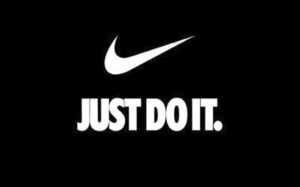by Gabrielle C. Durham
 Certain phrases choke us with their ubiquity at some point:
Certain phrases choke us with their ubiquity at some point:
- “Just do it.” (Nike)
- “Let’s get ready to rumble!” (Sports announcer Michael Buffer)
- “That’s hot.” (Paris Hilton)
- “Hasta la vista, baby.” (“Terminator 2: Judgment Day,” as delivered by Arnold Schwarzenegger)
Did you know these have all been trademarked? This means that you are supposed to have the owner’s permission to use any one of these phrases. These sentences were so popular at some time in history that their crafters applied to trademark and thereby protect the specific saying.
A trademark is any name, symbol, figure, letter, word, mark (such as the Nike Swoosh), or other device that is used by a manufacturer or a merchant to identify and promote a specific good or service and differentiate it from other similar goods or services from a competing manufacturer or dealer. Once you register a trademark, it is yours. You own it. In the United States, it is registered with the Patent and Trademark Office and only you can enjoy the exclusive use of your trademark. The word “trademark” was first recorded in the mid-16th century. (Property rights go way back in law; you could make the argument that they are the reason that laws arose.)
There are three kinds of trademarks: unregistered trademark, unregistered service mark, and registered trademark. The unregistered trademark is what we typically see when companies or people promote the goods they are hawking. The unregistered service mark is used when companies or people promote the services they are selling. The owners of a registered trademark can legally file suit against anyone who infringes upon the use of their trademark, i.e., use without asking for permission.
Now for the symbols: The choices are ® and ™. ™ identifies an unregistered trademark. ®, or registered, indicates a registered trademark. There is also the service mark SM, which is not commonly seen for most of us.
What is the importance of a trademark? Why do people care? Trademark infringement is a form of theft, specifically theft of intellectual property, as in the case of Navajo Nation suing the retailer Urban Outfitters in 2012 for wrongfully using the Nation’s trademark, which in this case was their identity. More recently in the news, there has been outcry about Disney’s trademarking the phrase Hakuna Matata from the 1994 movie “The Lion King.” It is a common saying in Swahili, and many feel that Disney is appropriating East African culture by trademarking it. This becomes relevant when considering that a new version of the movie is coming out in 2019.
Many of us can name some trademarked entities easily: iPod, “Gone With the Wind,” Cheetos, Toyota Prius. Below is a list of some that you may not have known (adapted lightly from www.thefreedictionary.com):
Seeing Eye dog – a guide dog trained to assist a blind person
Band Aid – an adhesive bandage to cover small cuts or blisters
Crock Pot – an electric cooker that maintains a relatively low temperature
Frisbee – a plastic disk about 10 inches in diameter for tossing between players for recreation or competition
Hoover – a brand of vacuum cleaner
Jaws of Life – hydraulic tool inserted into a wrecked vehicle by emergency personnel and to pry the wreckage apart to reach people trapped inside
Sharpie, Magic Marker – a pen with indelible ink that will write on any surface and cause parents everywhere to gnash their teeth in lamentation
Sheetrock – a kind of drywall product used in building to replace plaster
Skivvies – men’s underwear consisting of cotton T-shirt and undershorts
Teleprompter – a prompter that television performers use to read their lines
Vaseline – a brand of petroleum jelly
Spam – a canned meat product made largely from pork
Pablum – a soft form of cereal to feed infants
Realtor – a real estate agent who is a member of the National Association of Realtors in North America
Styrofoam – a light, resilient foam made from polystyrene
Some trademarks have expired, have not been renewed, or are no longer eligible for trademarking, at least in the United States. They are not legally protected in this country. Examples include:
- app store
- aspirin
- dry ice
- dumpster
- escalator
- heroin
- laundromat
- trampoline
- videotape
- yo-yo
- zipper
The Cheetos® dumpster leader of the free world tried to trademark the phrase “You’re fired” from his reality show in 2007 and was rejected. So, at least a tense, life-changing moment does not have to be one more reminder of a trademarked saying from a lame TV show.
Trademarked language affects you every single day, whether or not you realize it. “Super Bowl” is a trademark, so starting in mid-January around the United States, you will hear about bars’ and restaurants’ specials for the “Big Game” or “Game Day”; unless your local pub want to pay the NFL for using the term, they are advertising without using the term in question.
Do you use Kleenex or tissue? Do you use a Memory Stick or a flash memory storage device? Do you play Ping Pong or table tennis? When it’s hot outside, do you suck on a Popsicle or a water-based frozen treat? Do you use Scotch Tape or clear adhesive tape?
It may not seem like these differences matter, but they do. Announcer Michael Buffer of “Let’s get ready to rumble!” fame has earned $400 million since 1992 through his trademark. How ‘bout them apples? (unregistered trademark from 1997 movie “Good Will Hunting”)
